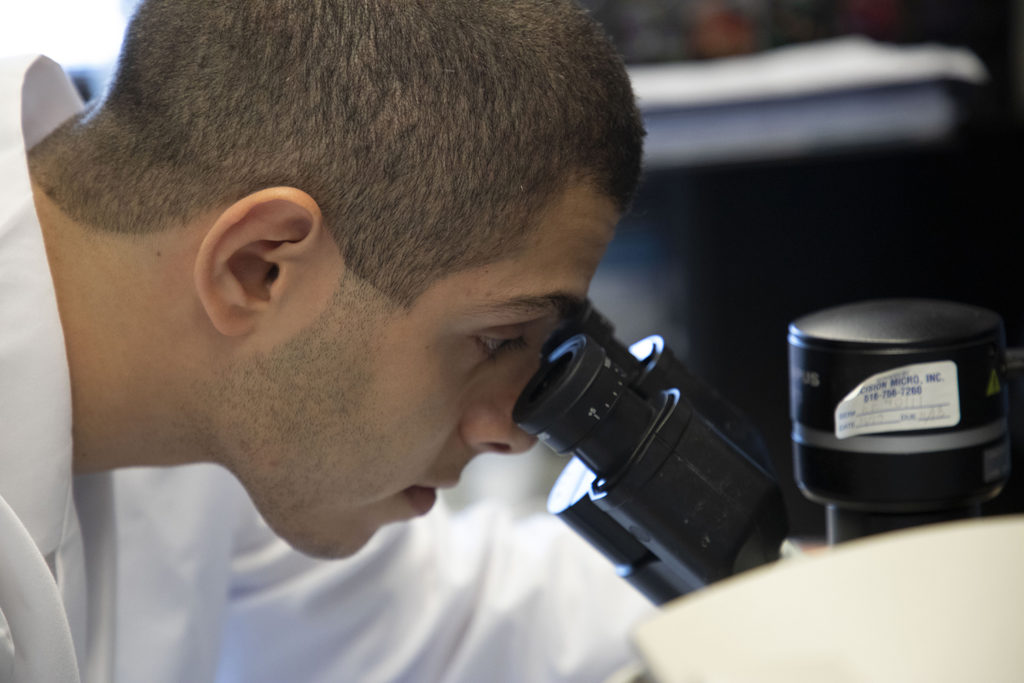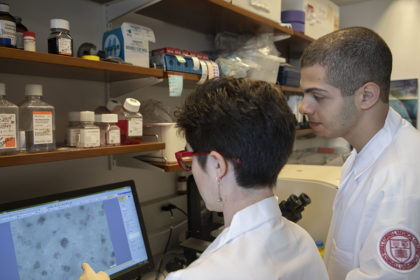Ibrahim Ozgenc’s cancer research is more than targeted — it’s precise

Cancer remains one of the most serious threats to human health, in part because most treatments have tended to use a one-size-fits-all approach. The rapidly developing field of precision medicine attempts to customize cancer treatment based on a genetic understanding of a patient’s disease. According to the American Association for Clinical Chemistry, “Within the next five years, the use of precision medicine in oncology is set to balloon, benefiting millions of patients globally.”
Ibrahim Ozgenc ’20, a biochemistry and molecular biology major, is contributing to that leading-edge research thanks to his Clark-funded summer fellowship. An intern at the Englander Institute for Precision Medicine at Cornell University’s Joan and Sanford I. Weill Medical College in New York City, Ozgenc employs the methods of precision and computational medicine to help develop individualized cancer treatments. Using tissue derived from patients, Ozgenc grows tumor organoids — miniature three-dimensional tumor structures that mimic patients’ tumors — upon which to test various drug treatment options. He also conducts computational analysis of the RNA-sequence results to better understand the underlying genetic expression of the tumor cells, and optimizes the use of different cell-viability assays (assessments) to improve the drug-screening results.

Ozgenc has assisted with the development of a new high-throughput drug-screening machine at Weill Medical. In addition to conducting rapid analysis of thousands of chemical and biological samples, the machine will create three-dimensional images of tumor organoid cells for evaluation after drug treatment.
Cancer research isn’t the only malady Ozgenc has studied. He plunged into research on Alzheimer’s disease during an internship at University College London, where he studied physiological changes in patients. A native of Northern Cyprus, Ozgenc also spent a summer at Acibadem University School of Medicine in Istanbul, Turkey, where he studied the amyloid-beta protein found in the brains of Alzheimer’s patients, and learned techniques and protocols specific to protein analysis.
In his senior year at Clark, Ozgenc plans to do biophysical chemistry research in the lab of associate professor of chemistry Noel Lazo, his academic adviser. Lazo conducts research on the amyloid-beta protein implicated in Alzheimer’s.
“Dr. Lazo has always been very supportive both as a professor and an adviser. He has supported my goals and helped me achieve them,” says Ozgenc.
He also has high praise for Denis Larochelle, associate professor of biology and program director for the biochemistry and molecular biology major. Ozgenc recalls a memorable moment in a Larochelle course when he and lab partner Rafael Levin ’21 successfully inserted DNA into a particular bacteria colony that made it glow in the dark.
“Dr. Larochelle was with us. It was a very satisfying moment, which reminded all of us in the class that patience is the key,” Ozgenc says. “His classes improved my work ethic and skill sets a lot, which gave me the confidence to apply for more competitive research internships.”
Ozgenc’s scholarly endeavors extend beyond the classroom and lab. He is director of operations for Clark’s Scholarly Undergraduate Research Journal (SURJ), and, with his brother Ismail Ozgenc and Abdur Rahman ’20, founded The Science Weekly, an online platform that focuses on molecular science with the primary aim of promoting research. In addition to authoring posts, the students have interviewed Dr. Sabina Islam of Harvard Medical School and Dr. Dervis Salih of the Institute of Neurology, University College London.
After graduating from Clark, Ozgenc hopes to pursue a doctorate in some aspect of cancer biology, neuroscience, genomics, or bioinformatics. His hands-on summer research opportunities have proved an important complement to his academic program.
“It really takes independent work to gain next-level experience in the field,” he says. “Clark gives me the privilege to do research almost full time and improve my skill sets.”


